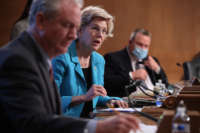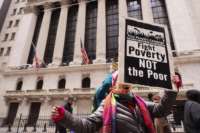
Horrifying videos emerged Monday of Border Patrol agents on horseback cracking their whips at migrants and chasing, grabbing and nearly trampling Haitians seeking asylum at the border, sparking outrage and scrutiny from immigration advocates and progressives.
The migrants were crossing the Rio Grande river carrying food and water when they were confronted with violence by border agents. The Haitian migrants later retreated to an overcrowded camp where 10,000 people, many fleeing political instability and violence, are hoping to be granted asylum and protected status by the U.S.
After the videos emerged on social media, the Department of Homeland Security (DHS) said that it is looking into the videos and the brutal practices used by Border Patrol, which is under DHS. The agency, which regularly enacts violence as the overseer of the largest immigration detention system in the world, called the footage “extremely troubling.”
Progressive lawmakers strongly condemned Border Patrol Monday.
Rep. Rashida Tlaib (D-Michigan) called on the House Oversight and Judiciary Committees to investigate the agency, saying: “This is so sick and [Customs and Border Protection] will continue to commit human rights abuses if we don’t stop it now. Cracking a fucking whip on Haitians fleeing hardship shows you that this system simply can’t be reformed.”
“These are human rights abuses, plain and simple,” wrote Rep. Ilhan Omar (D-Minnesota). “Cruel, inhumane, and a violation of domestic and international law. This needs a course correction and the issuance of a clear directive on how to humanely process asylum seekers at our border.”
Rep. Mondaire Jones (D-New York) called Border Patrol’s actions “unfathomable cruelty.”
Advocates for Haitian immigrants also condemned the footage. “They should stop deportations,” Alix Desulme, a Haitian city council member in North Miami, told Al Jazeera. “It’s been a cry way before” the Biden administration began ramping up deportations, said Desulme.
Indeed, Haitian migrants are attempting to escape perilous conditions in Haiti, undertaking often months-long treks by foot and truck to reach the border, where they hope to be accepted under humanitarian visas. The country has experienced massive political instability with the recent assassination of President Jovenel Moïse and a 7.2 magnitude earthquake that killed over 2,000 people, rendered nearly 130,000 homes uninhabitable and left about 684,000 people in urgent need of humanitarian assistance.
Many being deported to Haiti have not been back in years, and are returning amid political crisis, earthquake destruction and gang violence that has displaced thousands.
A man who fled after the 2010 quake, deported back with his wife & son, said: “There’s no security in Haiti.” pic.twitter.com/vwKAHxMJ2O
— AJ+ (@ajplus) September 21, 2021
The footage comes as the U.S. is deporting Haitians en masse, even as they face instability and potential death in Haiti.
“If you come to the United States illegally, you will be returned. Your journey will not succeed, and you will be endangering your life and your family’s life,” DHS Secretary Alejandro Mayorkas said Monday, justifying the agency’s use of a Donald Trump-era policy allowing for mass deportation during the pandemic.
What Mayorkas ignores in his statement is that Haitian immigrants only take such desperate measures as risking deportation because their lives and the lives of their families are endangered in Haiti and Chile, where many Haitian immigrants face racism and hostility.
“We don’t have money, we don’t have anything. We spent two months getting here on foot,” said Charles Edirame, a Haitian migrant who was traveling with his wife and daughter in Ciudad Acuña, Mexico. “In Haiti, we don’t have a president,” he told the El Paso Times “There was just an earthquake. How can I go back to Haiti? If I go back, I could die the next day.”
Monday’s footage fueled further calls for the U.S. to stop deportations of migrants to Haiti. Some Haitians in the U.S. have Temporary Protected Status that keeps them from being deported because the government has determined that the country is unsafe to return to. But the program leaves them in limbo with few avenues to attain permanent residency or citizenship.
Last week, over 50 Democrats signed a letter urging the Biden administration to immediately halt deportations to Haiti and provide entrance to the U.S. under humanitarian parole to Haitians at the border. Still, the administration is ramping up deportations, sending out hundreds of extra border agents to speed up the process.
“It doesn’t matter if a Democrat or Republican is President, our immigration system is designed for cruelty towards and dehumanization of immigrants,” wrote Rep. Alexandria Ocasio-Cortez (D-New York) on Monday. “Immigration should not be a crime, and its criminalization is a relatively recent invention. This is a stain on our country.”
This post was originally published on Latest – Truthout.




























